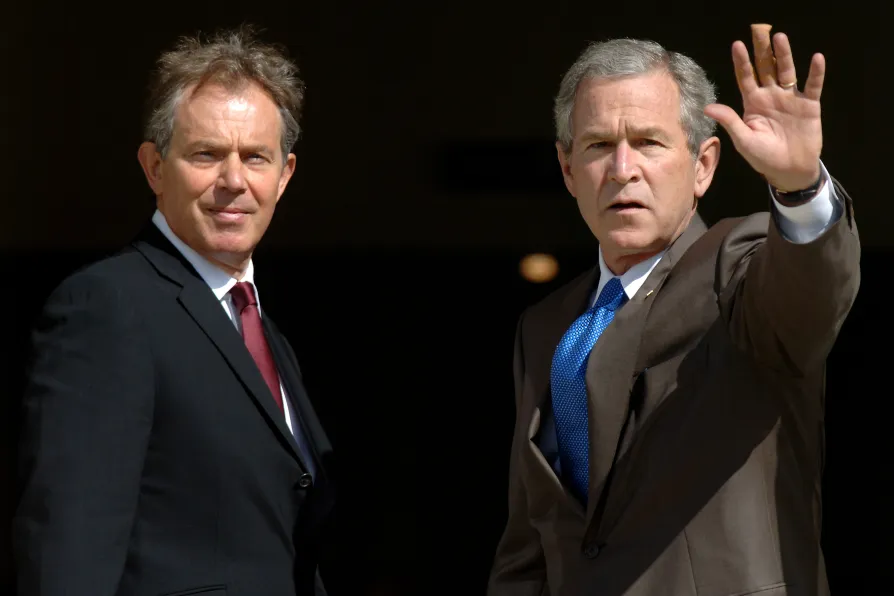This weekend, the NEU holds a special conference to debate changing its approach to organising teaching assistants, which a 2017 TUC agreement forbids. General secretary DANIEL KEBEDE outlines the choices before delegates
While Hardie, MacDonald and Wilson faced down war pressure from their own Establishment, today’s leadership appears to have forgotten that opposing imperial adventures has historically defined Labour’s moral authority, writes KEITH FLETT

 Prime Minister Tony Blair welcomes American President George W Bush to the first meeting of the G8 Summit at the Gleneagles Hotel in Scotland, July 7, 2005
Prime Minister Tony Blair welcomes American President George W Bush to the first meeting of the G8 Summit at the Gleneagles Hotel in Scotland, July 7, 2005
THE Labour Party emerged from the Labour Representation Committee, which was formed 125 years ago in 1900. There is then a good deal of history to review when it comes to how Labour leaders viewed capitalist wars.
Hardie was a pacifist who opposed the first world war on that basis, and so was Ramsay MacDonald, who briefly lost his Commons seat in 1918 on that issue. George Lansbury, who led Labour from 1932-35, campaigned on peace and world disarmament as the world approached the second world war.
Clement Attlee, by contrast, had seen distinguished service in the first world war, and after 1945 was the Labour prime minister who presided over the formation of Nato and the development of British nuclear weapons.
Hugh Gaitskell, although a figure of the Labour right, came politically from the 1945 world where a framework to avoid a repeat of the second world war had been developed, including the UN
So when Britain, France and Israel launched a military attack on Egypt over control of the Suez Canal, Gaitskell did not back it but instead called for law, not war. That is, he demanded a UN sanction before any action. No doubt it helped that the US was also not on board with the adventure, but so did demonstrations and some industrial action against it.
By contrast, Harold Wilson came from the centre-left of Labour. During his premiership between 1964-70, he was faced with US pressure to back the Vietnam war by sending troops, but also an anti-war movement. Wilson advocated for peace and did not send troops. However, he secretly allowed the US to use British bases in the Far East to prosecute the war.
More recent leaders provide the same contrast between left and right. Michael Foot was a veteran CND campaigner but also managed to back Thatcher’s Falklands War. Blair put forward what has now become a familiar Janus face. He argued that British military interventions were based on an ethical foreign policy, which could lead to politically progressive conclusions.
However, the 2003 Iraq war, which led to chaos and the deaths of millions, underlined the realities.
In 2003, Starmer was a human rights lawyer. He wrote in the Guardian on Blair’s decision to back war with Iraq without clear backing from the UN. He made clear that Sections 42 and 51 of the UN charter were relevant.
He didn’t think it was clear that the requirements of either had been met, and as a matter of record, he opposed the war.
Fast forward 22 years, and Starmer as Labour leader has refused to call for a permanent ceasefire in Gaza despite a UN resolution which, in effect, required this to happen.
He has yet to express a definitive view on a US war with Iran, but as ever, supports Israel’s right to defend itself, even though it is the aggressor. He also seems to think Iran has a nuclear bomb, for which there is no evidence.
Foreign Secretary David Lammy has said that Labour policy is both ethical and in support of Nato which appears and actually is a contradiction.
Whether it’s Wilson who circumvented opposition to the Vietnam war, or Blair who backed the Iraq war come what may, wrecking his political career in the process, it’s clear that opposing wars has a significant political impact.
That is probably what led Starmer to take his 2003 position against war on Iraq, and ignoring protests on Gaza and Iran will write his political obituary just as it did for Blair.
Keith Flett is a socialist historian. Follow him on X @kmflett.














